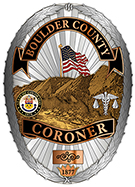Colorado Revised Statute 30-10-606(1) defines which types of deaths are required to be reported to the coroner’s office and, subsequently, investigated by the coroner or by an agent of the coroner. If a coroner’s investigator is involved in investigating the death of your loved one, it is because it is required under Colorado Law.
Transport for Examination
In order to accurately and completely investigate a death, an examination may be necessary. If an autopsy examination is required, it will be completed by a board certified forensic pathologist. If an external examination is required, a pathology technician, a forensic investigator or a board certified forensic pathologist will perform the examination depending on the extent of circumstances and history surrounding the death. As a result, it is sometimes necessary to transport the decedent to our facility for further examination.
Process after Transport
Until the examination process is completed, your family member will remain in the care of the Boulder County Coroner’s Office. In the meantime, it is recommended that you take some time to contact other family members and develop a support system in order to help with this difficult time. The next-of-kin should choose a Mortuary, contact them, and complete the necessary paperwork that they require.
Next of Kin
The legal next of kin hierarchy is described by Colorado Revised Statutes.
- The decedent if acting through a legal declaration;
- Either the appointed personal representative or special administrator of the decedent’s estate; or
- The nominee for appointment as personal representative under the decedent’s will if a personal representative or special administrator has not been appointed;
- The surviving spouse of the decedent, if not legally separated from the decedent;
- A person with the right to direct the disposition of the decedent’s last remains in a designated beneficiary agreement;
- A majority of the surviving adult children of the decedent;
- A majority of the surviving parents or legal guardians of the decedent;
- A majority of the surviving adult siblings of the decedent;
- Any person who is willing to assume legal and financial responsibility for the final disposition of the decedent’s last remains.
Transport to Mortuary
Once all examinations have been completed the decedent may be released to the selected mortuary. Most releases occur within 72 hours of the Coroner taking custody of the decedent. This timeframe is an estimate.
Choosing a Mortuary
The Boulder County Coroner’s Office unfortunately cannot recommend or refer you to a Mortuary, or discourage you from selecting a certain one.
Payment for Coroner Services
There is no charge for any of the services provided by the Boulder County Coroner’s Office, including any post-mortem examination and secure storage until a mortuary has been selected.
Organ & Tissue Donation
Eligibility requirements for donation are specific to each person and are determined by the organ, tissue or eye recovery organization. If you would like to pursue donation you can contact one of the many local agencies and inquire about whether your family member is eligible. The coroner and/or forensic pathologist can also decide against allowing donation for purposes of an effective investigation and, as such, the donation agency that you choose will contact the Boulder County Coroner’s Office to verify that donation is possible.
Personal Property
Any property that was with or on the decedent at the time of their death collected by the Coroner’s Office will be inventoried and will remain in secure storage until the decedent is released to a mortuary. This goes for any property that is located during the autopsy as well. The property can either be picked up by the mortuary or can be picked up by the next of kin at the Boulder County Coroner’s Office with valid photo identification.
Viewings
Unfortunately, the Boulder County Coroner’s Office does not have an appropriate facility to accommodate viewings. The best way to have a viewing is to coordinate with the mortuary that has been selected.
Death Certificate
In deaths where no further studies or no further investigation is needed, our office will generally complete the death certificate within 72 hours of receiving a request by the mortuary. In deaths where further studies or further investigation is needed, the death certificate will be completed once all studies and investigations have been completed. This can take approximately 10 to 12 weeks depending on the complexity of the death. Once the final death certificate has been issued, you can obtain copies of it from the mortuary that you selected. Alternatively you can order one from Boulder County Public Health Death Certificates.
Paying for Final Arrangements
There are generally two options for you in case you cannot afford to pay for funeral arrangements:
- If your family member was a veteran they will generally be eligible for burial benefits through Veteran’s Affairs. The Veteran’s Affairs office can be contacted by calling 1-800-827-1000.
- Your family member might be eligible for burial assistance through Boulder County. In order to inquire about burial assistance eligibility, contact the Department of Housing and Human Services at 303-441-1000.



